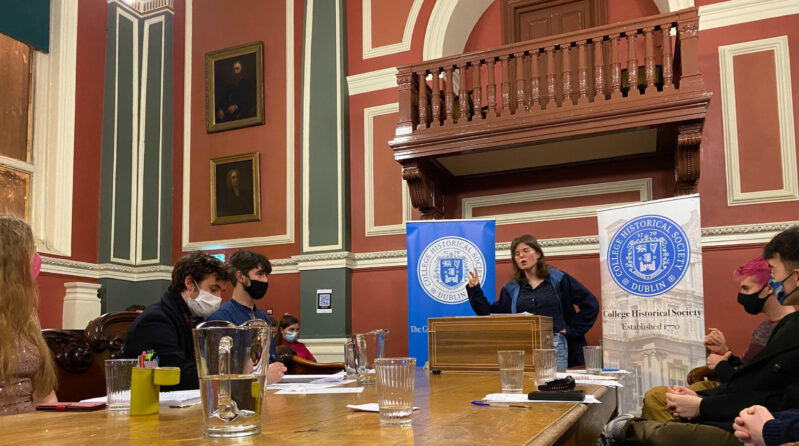What better time to dissect the demise of American hegemony than now? A fresh retreat from Afghanistan, mounting Chinese sanctions and escalating diplomatic tension with Russia over Ukraine have contributed to the view that the USA is no longer the global superpower it once was.
Last night in the Graduates Memorial Building (the GMB), the College Historical Society (the Hist) and DU History tackled this very question, debating the motion “this house believes American supremacy has ended”.
The proposition began with a strong overview of the United States’ dwindling credibility on the world stage. Seán Gordon Dalton touched on Trumpian isolationism, a less bombastic foreign policy and the buzzword of the evening: democracy. Referencing the failed coup d’etat of January 6th, 2021, he made a strong case for the shrinking power of the US.
Sam Kelly of the opposition opened by acknowledging that America has passed its apex of influence, but categorically denied that the end is nigh. He asserted that the relative power of the US across culture, economics and military presence trumps that of the next comparable country. Not the only American national speaking at the debate, Kelly admitted a certain level of bias which, instead of hurting him, proved to be an asset.
Continuing for the proposition, Caoimhín Hamill tackled Obama’s struggle to revive the economy after 2008, and the difficulties faced by larger states concerning terrorism and divisive political ideologies. He finished his argument with a flourish: “It’s ending, it’s over, get used to it”.
Ailbhe Noonan gave an anecdotal account of the US’s failure at nation-state building exercises from her expatriate experience in Egypt, highlighting a lack of English-speaking institutional support and an ideological migration away from Western influence. Closing for the proposition, Sinziana Stanciu accused the United States of being an inconsistent power, pointing at its many “uninvited wars”, the exodus of tech companies and economic migrants and the meteoric rise of K-pop.
Both sides struggled to establish a consistent definition of what constitutes a supremacy throughout, an issue tackled by speakers towards the end of the debate. This primarily affected the proposition’s overall performance when subjected to semantic scrutiny from across the table. Furthermore, the proposition’s argument largely stuck to listing the many offences and wrongdoings of the American government in recent decades, with one speaker pointing at the Vietnam war as a watershed moment in the country’s decline. Although an effective strategy to expose a history of malpractice, it did little to account for the enduring relevance of American foreign policy.
The opposition skilfully compared the US to its international counterparts to illustrate its leonine relevance. Terence O’Donovan refuted China’s superiority, referring to its ageing population and celebrating the US’s continued lead in science and economics. Niall Dineen recalled other instances wherein the US faltered, only to overcome adversity, reminding the audience of what he alleged is the main reason why Ukraine and Taiwan have not yet been invaded by Russia and China.
Aisling Rooney closed the debate with a searing criticism of the supposed land of the free: “America is not a democracy and has never been a democracy”. She said that its supremacy rests instead on its imparted culture of capitalism, activism and excess on the global psyche, the effects of which supposedly cannot be understated.
When the debate was opened to the floor, the final speaker posed a most compelling question: if American supremacy is well and truly over, why does the rest of the world still look stateside in all matters of international affairs? According to a member of the audience, American supremacy will only end when the world stops asking: “What’s the US going to do?”
The motion did not ask whether the US was a force for good in the world, but rather, whether it was the strongest force in the world, and though its supremacy is threatened, it has not yet been ended.
While the proposition succeeded in proving that the United States is indeed on the decline, speakers failed to prevent a considerable victory for the opposition. The star-spangled banner may wave another day.






